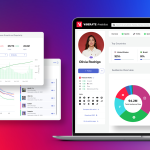Amid the rubble of Facebook’s public perception, Mark Zuckerberg stands alone, unfazed, ready with a new offer with which he hopes to finally win back some semblance of goodwill. Or so the cheery-faced CEO claims. Few are likely to buy in to his self-proclaimed mission of ‘helping people deliver and experience a much stronger sense of presence with the people they care about’, and creating the ‘holy grail of social interactions’. The Metaverse, an ‘embodied internet’, an amalgam of digital and live, will be an untold bounty of data, a Willy Wonka paradise of user information to be packaged and sold for profit. As one would expect, the net is rife with speculation about Zuckerberg’s end-game. Is this ambitious re-brand simply a sleight of hand to draw eyes from the compost heap of Facebook PR disasters? Or is this a project that seriously aims to reshape the fabric of our social lives, positioning Facebook as the gatekeeper to an unprecedented vault of user information?
The Great Data Harvest
Unsurprisingly, VR (virtual reality) and AR (augmented reality) gather huge amounts of data. And unlike Facebook, whose data-siphoning abilities are limited to what can be gleaned by a mobile or computer device, Meta will have access to data about you and your body, the way you move, the way you talk. A project on this scale has never before been conducted. If Facebook – Meta – is able to create an attractive virtual co-reality, then it will hold the keys to the biggest data harvesting machine in human history. VR systems gather data about facial muscle movements, emotional responses, body language and physical health indicators. VR researcher Jeremy Bailenson reported,
“Commercial systems typically track body movements 90 times per second to display the scene appropriately, and high-end systems record 18 types of movements across the head and hands. Consequently, spending 20 minutes in a VR simulation leaves just under 2 million unique recordings of body language. Psychologists have never, in the decades of studying nonverbal behavior, had data sets of this magnitude”.
So Mark will have his precious data coming out his ears. He will have his desired position in the corner of everyone’s living room. And the data he will earn while peering at you between the blinds won’t just be used to target shaving cream ads with greater precision. This kind of data can go to biotech startups, robotics engineers and AI developers, as well as the usual corporate roster. It could, in theory, position Facebook/Meta as a major card-holder in the technological developments to come.
Will it work?
Ingenious plan or not, Zuckerberg’s bid will amount to very little if no one elects to use it. The wager relies on Metaverse supplying real value to consumers. So far, the response to Zuckerberg’s announcement has been one of wry amusement and mockery. As is most often the case when Zuckerberg puts on his public-ready face and shows himself in a ‘natural’ setting, the internet laps up a rare opportunity to deride every visible detail of this elusive man’s (or humanoid personage’s) life. Users in YouTube comments refer to the Metaverse as the gift ‘nobody asked for’, expressing their desire to return to a post-pandemic normal, not ascend to some futuristic VR plane.
Zuckerberg talks about how our social lives are mediated through ‘small, glowing rectangles’. This is an unnatural platform for social exchange, one he seeks to upgrade with the Metaverse. The issue with this vision is that, for most of us, digital is necessarily a supplement to the real-world. We call and text each other, not as a substitute for live interaction, but as a convenient addition. Most of us are happy that digital communication stays limited, because that reinforces its secondary nature. Zuckerberg talks about VR interaction as though our collective utopia consists in barricading ourselves indoors and holding VR gatherings with friends living two doors down.
A rival for live interaction
This has been the problem with virtual developments from the start. In the midst of the pandemic, several enterprising individuals sought to recapture dwindling business with virtual events, conferences and lectures. They all learned that ‘event’ negates ‘virtual’, at least with the tools currently at our disposal. Fortnite gatherings, with thousands of attendees, are somewhat closer, as each player controls an avatar, navigates a landscape and shares fluid mechanics with hundreds of others. You can feel as though you’re attending an event when large numbers of players gather.
Zuckerberg wants to bring these fluid mechanics to social media. If the technology works, you could talk to friends living halfway across the world with a much higher degree of fidelity. You could host virtual hangouts that wouldn’t feel completely stupid. It’s a big hurdle to overcome, but there would be definite utility in the service if the technological challenges were conquered.
In a Twitter survey, a majority of participants said they flat-out would not buy a Facebook product. So Zuckerberg’s vision may be doomed altogether. The truth is, however, if not our beloved Mark, then someone else will be developing this tech. And whoever develops it will probably also be controlling more data than history has ever known. Ross Pike of web design agency Koreti Ltd comments, ‘While we tend to lambast the Zuckerbergs of big tech, it is partly the technology itself we should fear, not just the people. Whoever controls the technology in development right now will hold a huge amount of power over the dissemination of information and our lives at large. What we need is for the regulation to catch up with the tech before things get out of hand.’ With the Senate poised to thwart Facebook’s future growth, such regulations may be at hand. If not, Facebook could have free reign in the biggest sandbox of data we’ve ever seen — and if that thought doesn’t strike fear into you, the last 2 years have truly desensitised you to any threat of global disaster.
Author Bio
Theo Reilly is an independent writer and multilingual translator whose goal is to counteract stale writing in business blogs. Theo has particular interest in business and marketing-related matters surrounding the online world, web design, exhibitions and events.








